
Domaine Weinbach Wines
From 70 acres of vineyard, certified 100% biodynamic and comprising plots in four celebrated Alsace Grand Crus as well as a historic, walled-in “monopole” dating back centuries, Domaine Weinbach...Read More
Domaine Weinbach | Thrilling, Food-Friendly Stars of Alsace
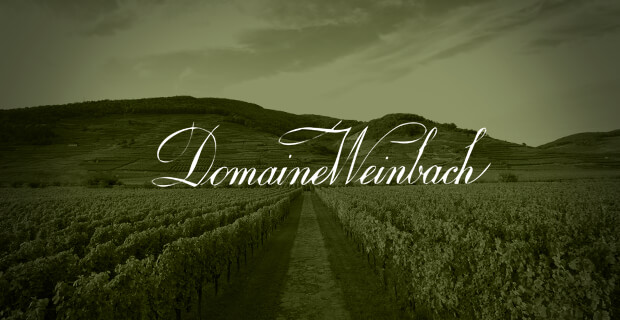
The History of Domaine Weinbach
While the property has been planted with vines since the 9th century, the history of Domaine Weinbach really begins with the Capuchin friars, who established a winery here in 1612. It was the monastery that first really developed this land for winegrowing, a legacy immortalized by the image of a monk on the labels of the estate’s wines and by the name of the estate’s most famous vineyard, the walled 12-acre monopole, Le Clos de Capucins. The estate remained the property of the Capuchins monastery until the French Revolution, when it was seized by the French state.
In 1898, Domaine Weinbach was sold as national property to the Faller brothers, who left it to their son/nephew Theo Faller. It was Theo Faller, with the help of his wife Colette Faller, who developed the estate from its original 12 acres to its current 70 acres. When Theo passed away in 1979, the management of the estate was entrusted to Colette and her two daughters Catherine and Laurence Faller. Over the next 30 years, Laurence would run the winemaking, elevating Weinbach wines to the high quality they display today. Out in the vineyards, the team switched to an organic approach as early as 1990 and the official conversion to biodynamic viticulture began in 1998. By 2005, Domaine Weinbach was certified by both Demeter and Ecocert.
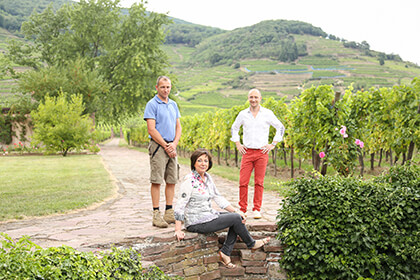
Since 2016, Domaine Weinbach has been led by Catherine Faller and her two sons, Eddy and Theo. Theo Leiber-Faller works mostly in the vines, taking care of the estate vineyards. The winemaking is led by Domaine Weinbach Cellar Master Ghislain Berthiot.
The Domaine Weinbach Terroir: A Collection of Prized Plots
Situated in Kientzheim, near Kayserberg, in the Alsace region of northeastern France, Domaine Weinbach was named after a small stream that cuts through the property. Since their arrival at the estate back in 1898, the Faller family has gradually expanded the property from the original flagship 12-acre monopole Clos des Capucins through the strategic acquisition of plots in four Grand Cru areas near the Weinbach Valley. Out of these perhaps the best known is Schlossberg, the oldest Grand Cru of Alsace and one of the world’s greatest Riesling vineyards, of which Domaine Weinbach owns around 20 acres. Here, Riesling thrives in granite soils, which lend the wines a fine structure and palpable finesse.
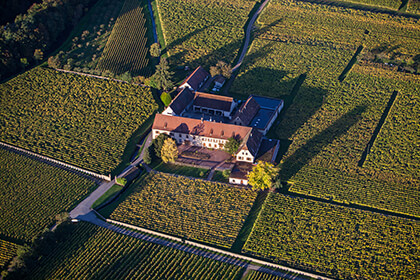
Meanwhile, the marl, limestone and sandstone terroir of their steep, south-facing Grand Cru Furstentum vineyard provides the perfect environment for the cultivation of Gewurztraminer, which creates remarkably aromatic, complex and age-worthy wines. Just below this Grand Cru, the Weinbach team cultivates Pinot Noir, Pinot Gris and Gewurztraminer in the sandier soils of the lieu-dit Altenbourg. Gewurztraminer also thrives in the calcium and magnesium rich soils of the south-facing Domaine Weinbach Grand Cru Mambourg vineyard. Here, very ripe Gewurztraminer creates wines of great body and elegance. In the eastern and southeastern-facing vineyards of the Grand Cru Marckrain, Domaine Weinbach cultivates Gewurztraminer and Pinot Gris.
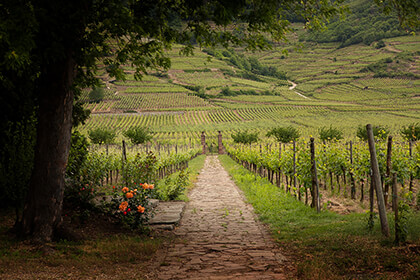
Since 2005, all 70 acres of Domaine Weinbach vineyard have been run with a biodynamic approach, certified by both Ecocert (organic) and Demeter (biodynamic). The team treats the vineyard soils with biodynamic preparations made from plant-based products (like nettle, willow and horsetail) as well as animal-based products (cow horns and manure), which help reinforce the vines’ natural defenses against pests and disease. The soil is ploughed and treated in a way that encourages a greater biodiversity of bacteria and fauna, and to enable the vines to develop thicker, longer and stronger roots. The vines are treated as part of a greater ecosystem, whose overall harmony and balance results in complex and healthy fruit and more unique, pure expressions of terroir in the wines.
Winemaking at Domaine Weinbach
At Domaine Weinbach, the grape harvest is entirely manual. The fruit is brought to the winery at the optimal stage of ripeness. They then undergo a minimal intervention vinification with a focus on maintaining the purely terroir-driven characteristics of each batch. The fruit is whole-cluster pressed in a gentle and progressive way, then transferred into very old, large oak foudres, where they undergo alcoholic fermentation on indigenous yeasts. The fermentation process takes a long time and is quite gradual, with mechanical intervention kept at a minimum. The wines are bottled without fining.
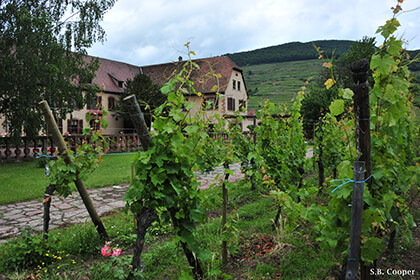
The Wines of Domaine Weinbach
The diverse Domaine Weinbach portfolio offers a brilliant expression of some of Alsace’s best terroirs through the flagship grape varieties of the region: Sylvaner, Pinot Blanc, Riesling, Pinot Gris, Gewuztraminer and Pinot Noir. Their varietal wines labelled “Reserve” are made mostly with old vines surrounding the property, originally planted by Theo Faller. For example, the Weinbach “Reserve Personnelle” Riesling is a superb expression of this variety, revealing joyful white flower fragrances and hint of lime on the nose, along with crisp apples and a very fine minerality on the palate. This straightforward, easy-drinking dry Riesling will pair with a very wide range of cuisines, including raw or cooked fish and shellfish dishes, white meats and smoked meats. Try it with a fresh crayfish salad or a classic Alsatian sauerkraut.
Domaine Weinbach wines labelled “cuvée”, “terroir” and “Grand Cru” are plot-selection bottlings, each one expressing a unique set of variety-terroir-microclimate, the pure identity of a specific location and the grape variety that grows there. The Domaine Weinbach Riesling Grand Cru “Schlossberg” is a glorious representation of a legendary plot through a wine that is luscious and aromatic on the palate with an intense, structured and firm palate revealing a mouthwatering salinity and slightly smoky minerality. This is an excellent white wine to age for decades and pair with grilled fish or prawns sauteed with garlic and herbs.
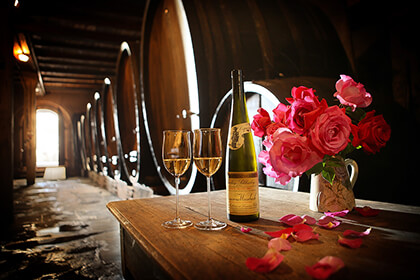
Meanwhile, the Weinbach Pinot Gris “Clos des Capucins” reveals on the nose delicate aromas of pear, quince and lime blossom. A well-rounded yet lively palate brings out tons of freshness, followed by a bright and juicy finish. This generous white wine will pair beautifully with white meats, like veal and chicken, especially when served in a rich cream sauce. They will also go nicely with more oily fish, like smoked mackerel.
And, for those with a sweet tooth, Domaine Weinbach also produces a range of Vendanges Tardives, Selection de Grains Nobles and Quintessence de Grains Nobles wines from overripened from and botrytis. These are exquisite and rare dessert wines that will pair perfectly with foie gras or blue cheeses.